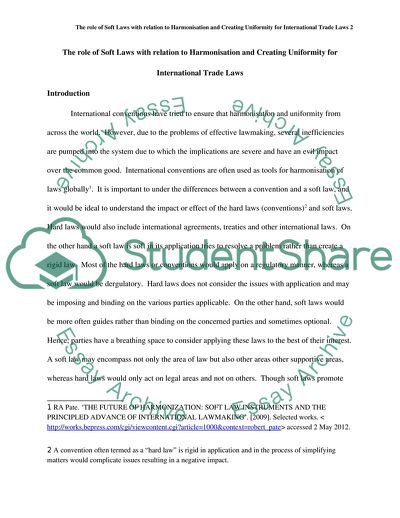
- Home
- Free Samples
- Premium Essays
- Editing Services
- Extra Tools
- Essay Writing Help
- About Us
- Studentshare
- Subjects
- Law
- Role of Soft Laws with relation to Harmonisation and Creating Uniformity for International Trade Law
Role of Soft Laws with relation to Harmonisation and Creating Uniformity for International Trade Law - Coursework Example

- Subject: Law
- Type: Coursework
- Level: Undergraduate
- Pages: 22 (5500 words)
- Downloads: 0
- Author: mackenzie27
Extract of sample "Role of Soft Laws with relation to Harmonisation and Creating Uniformity for International Trade Law"
International conventions are often used as tools for the harmonization of laws globally. It is important to under the differences between a convention and a soft law, and it would be ideal to understand the impact or effect of hard laws (conventions) and soft laws. Hard laws would also include international agreements, treaties, and other international laws. Hard laws would also include international agreements, treaties, and other international laws. On the other hand, soft law is soft in its application and tries to resolve a problem rather than create a rigid law. Most of the hard laws or conventions would apply in a regulatory manner, whereas a soft law would be deregulatory. Hard laws do not consider the issues with application and may be imposing and binding on the various parties applicable. On the other hand, soft laws would be more often guides rather than binding on the concerned parties and sometimes optional.
Hence, parties have a breathing space to consider applying these laws to the best of their interest. A soft law may encompass not only the area of law but also other areas and other supportive areas, whereas hard laws would only act on legal areas and not on others. Though soft laws promote self-regulation, they seek a principled and logical approach to international lawmaking. Soft laws are more binding on the concerned parties as they are a commitment that is made through negotiations. A soft law would to a very minimal extent by authorities.
On the other hand, hard laws are established by the authority and enforceable on anybody who is doing international trade. It is also important to note that soft laws with time may evolve into hard laws, or may influence the parties who are performing trade to become more compliant with the hard law practices. Soft laws can be considered as bridges between no commitments and commitments that are legally binding3. Unification and harmonization have been considered a principle in various legal systems since the Roman Empire. Today commercial law between major trading nations is done through the uniform boy of commercial laws5 and many of the sovereign nations are adopting these regulations6.
CHECK THESE SAMPLES OF Role of Soft Laws with relation to Harmonisation and Creating Uniformity for International Trade Law
How has the European Convention on Human Rights contributed to international human rights law
Prerequisites for International Sale of Goods
European Social Model
The programme for the harmonisation of Company Law in the European Union
The Laws of International Commerce Are Subject to Increasing Harmonisation
The Ineffectiveness of the Provisions of SGA in Allocating Risks
The United Nations Commission on International Trade Laws
Harmonisation of International Commercial Law

- TERMS & CONDITIONS
- PRIVACY POLICY
- COOKIES POLICY